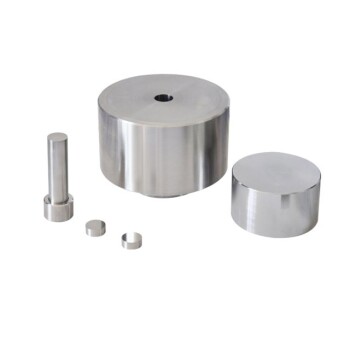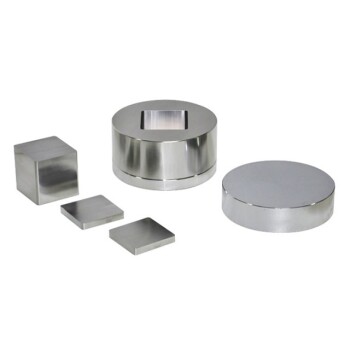In short, hydraulic presses are used in nearly every industry that requires the shaping, compressing, assembling, or testing of materials. Their primary applications range from heavy manufacturing tasks like forging metal and stamping automotive body panels to precision laboratory work like preparing samples for spectroscopic analysis.
The true value of a hydraulic press lies not just in its immense power, but in its ability to apply that force with exceptional control. This unique combination makes it an indispensable tool for an incredibly diverse set of industrial and scientific tasks.

The Core Principle: A Master of Controlled Force
At its heart, a hydraulic press is a force multiplier. It uses a non-compressible fluid, typically oil, to translate a small force applied to a small area into an immense force exerted over a large area.
Pascal's Principle in Action
This operation is governed by Pascal's Principle. Pressure applied to an enclosed fluid is transmitted undiminished to every portion of the fluid and the walls of the containing vessel.
By using pistons of different sizes, a small effort on a narrow piston generates massive force on a wider piston, enabling the press to bend thick steel or compact dense powders with relative ease.
The Result: Power and Precision
Unlike mechanical presses that deliver maximum force only at the bottom of their stroke, a hydraulic press can exert its full, consistent force at any point. This gives operators unparalleled control over forming, compressing, and assembling operations.
Applications in Heavy Manufacturing and Fabrication
The ability to generate and control massive force makes the hydraulic press a cornerstone of modern manufacturing.
Metal Forming and Shaping
This is the most common application. Tasks include forging (shaping hot metal), stamping (creating car body panels), and bending (forming structural beams for construction). The consistent pressure is ideal for deep-drawing operations, creating complex parts without tearing the material.
Compacting and Baling
Industries use hydraulic presses to reduce the volume of materials. This includes compacting metallic powders into solid forms for ceramics or metallurgy and baling scrap metal into dense, manageable blocks for recycling.
Cutting and Shearing
The immense, controlled force is also used for shearing and cutting thick metal plates. The press pushes a hardened tool through the material, delivering a clean cut that other methods cannot achieve.
Precision Applications in Assembly and Testing
Beyond brute force, the control offered by hydraulic systems is critical for tasks that require precision and feedback.
Assembly and Press-Fitting
In assembly lines, presses are used for press-fitting bearings into housings, joining components with rivets, or crimping electrical connectors. The force can be applied gradually and precisely to avoid damaging the components.
Laboratory Sample Preparation
In scientific labs, hydraulic presses are essential for creating homogenous samples for analysis. They are used to compress powdered materials, like potassium bromide (KBr), into thin, transparent pellets for FTIR spectroscopy or to create uniform discs for X-Ray Fluorescence (XRF).
Material Strength and Quality Testing
Engineers use hydraulic presses to perform tension and compression tests. By applying a measured force until a material breaks or deforms, they can verify the strength of concrete, the integrity of a weld, or the durability of an aerospace component.
Understanding the Trade-offs
While incredibly versatile, hydraulic presses are not the solution for every problem. Understanding their limitations is key to using them effectively.
Speed vs. Power
Hydraulic presses are generally slower than their mechanical counterparts. For high-speed, high-volume stamping operations, a mechanical press is often more efficient.
System Complexity
The hydraulic system, which includes pumps, valves, hoses, and fluid, requires regular maintenance. Leaks or contamination in the hydraulic fluid can degrade performance or lead to system failure.
Footprint and Cost
Machines capable of generating thousands of tons of force are inherently large, heavy, and represent a significant capital investment. The foundation required to support such a machine is also a major consideration.
Making the Right Choice for Your Goal
The decision to use a hydraulic press depends entirely on the specific requirements of the task.
- If your primary focus is high-volume, rapid production of simple parts: A mechanical press may offer a better return on investment due to its higher cycle speed.
- If your primary focus is forming complex shapes, deep-drawing, or working with variable materials: The consistent force and precise control of a hydraulic press are indispensable.
- If your primary focus is precision laboratory work or material strength testing: The unparalleled control, feedback, and adjustable force of a hydraulic system are non-negotiable.
Ultimately, choosing the right tool begins with understanding that a hydraulic press is a master of applying controlled force.
Summary Table:
| Application Area | Key Uses |
|---|---|
| Heavy Manufacturing | Forging, stamping, bending, compacting, shearing |
| Assembly and Testing | Press-fitting, material strength tests, quality control |
| Laboratory Work | Sample prep for FTIR, XRF, spectroscopy |
| Recycling and Compacting | Baling scrap metal, powder compaction |
Enhance your operations with KINTEK's precision lab press machines! Whether you're in manufacturing or laboratory research, our automatic lab presses, isostatic presses, and heated lab presses deliver controlled force for reliable results. Contact us today to discuss how our solutions can optimize your material shaping, testing, and sample preparation processes.
Visual Guide

Related Products
- Laboratory Hydraulic Press 2T Lab Pellet Press for KBR FTIR
- Automatic Laboratory Hydraulic Press Lab Pellet Press Machine
- Manual Heated Hydraulic Lab Press with Integrated Hot Plates Hydraulic Press Machine
- Laboratory Hydraulic Press Lab Pellet Press Button Battery Press
- Manual Laboratory Hydraulic Press Lab Pellet Press
People Also Ask
- What are some laboratory applications of hydraulic presses? Boost Precision in Sample Prep and Testing
- What role does a laboratory hydraulic press play in carbonate powder prep? Optimize Your Sample Analysis
- Why must a laboratory hydraulic press be used for pelletizing samples for FTIR? Achieve Precision in Spectral Data
- How are hydraulic presses used in spectroscopy and compositional determination? Enhance Accuracy in FTIR and XRF Analysis
- What role does a high-pressure laboratory hydraulic press play in KBr pellet preparation? Optimize FTIR Accuracy



















